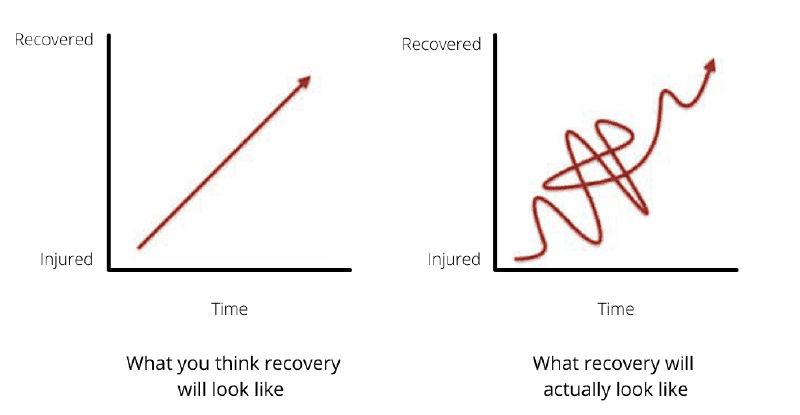By Dr. Lauren Quattrocchi, DC
3 Minute Read

This can be discouraging but it is important to remember that just because you may have a bad day or a setback with your injury does not mean you have lost progression. We all have expectations after an injury that the treatment process will be straight forward and you will resume all activities before you know it. This is not always the case as there will be obstacles in our path, and there may be setbacks along the way but being prepared for this will make it much easier to accept and you will feel less frustrated. We all have to be realistic that when coping with an injury we still have the demands of everyday life. Although bending forward may irritate your low back pain and you have been told to avoid that movement, you may have no choice but to lift your child out of the crib. Yes, this will most likely create some irritation in your back but this is why setbacks occur and bad days will happen along your road to recovery.

Remember, a setback does not mean that treatment is not working, that no progress has been achieved or that you can never return to your activity but rather you may have to reduce the intensity of your exercise for a period of time, be consistent with treatment and focus on rehab in order to fully recover and reach your goals. This is why it is so important to ensure you are properly educated on your injury and listen to the advice given from your clinician. If they recommend no running for a week or reducing your distance from 10km to 5 km, it is very important you listen. There is a reason why restrictions or rules are in place but the more important aspect is that setbacks do occur and the perfect linear path is more likely not to be true. If you decide to ignore the recommendations and push your body more than it is ready then you may experience a flare up or tissue irritation.
There are a few things you can do to minimize setbacks and get the most out of your treatment.
- The first is to become educated and ask your clinician questions about your injury. Understanding your injury and how to best manage it is one of the most important factors for a successful outcome. This will not only help guide you to cope with your pain but having a better understanding makes it easier to adhere to your treatment plan.
- Completing your at-home exercises is another important aspect to avoid setbacks. If you were instructed to take a new medicine prescription you would never just take it when you felt like it, you have to stay on a consistent schedule. Exercises/treatment should be treated in the exact same manner as they are a large part of your recovery. It is important to not only perform your exercises but ensure you are doing them correctly at home. Never be afraid to ask your therapist to review your technique and get advice regarding activities to avoid, when to rest and how to avoid further injury.
- Make sure you take note of your improvements and progress along the way. It can be very frustrating to attend weekly appointments, be diligent with your rehab and feel like you are not making any change. Your clinician will have certain measures to track your progress (range of motion, tissue tightness, mobility) but it is key to also set your own measures to track your progress. It could be something as simple as being able to walk down the stairs pain free or take the dog out for a walk with no back pain, but all of these little measures will help you see the improvements you have made.
- The last thing that is important when trying to avoid setbacks and become discouraged is to set realistic goals. The goals of recovery are individualized for every patient as some may want to run a marathon and others may just want to be able to get up and walk around the house pain free. Take time to discuss your goals and remember it may not be a direct path to the end.


